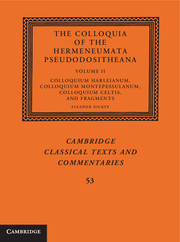Book contents
- Frontmatter
- Dedication
- Content
- List of plates page
- List of figures
- Acknowledgments
- Part One Colloquium Harleianum
- 1 Introduction to the Colloquium Harleianum
- TEXT, TRANSLATION, AND CRITICAL APPARATUS
- 2 Index Siglorum
- 3 Colloquium Harleianum
- Commentary
- 4 Commentary
- Part Two Colloquium Montepessulanum
- 5 Introduction to the Colloquium Montepessulanum
- Text, Translation, and Critical Apparatus
- 6 Index Siglorum
- 7 Colloquium Montepessulanum
- Commentary
- 8 Commentary
- Part Three Colloquium Celtis
- 9 Introduction to the Colloquium Celtis
- Text, Translation, and Critical Apparatus
- 10 Index Siglorum
- 11 Colloquium Celtis
- Commentary
- 12 Commentary
- Part Four Related texts
- 13 Editions of Papyri Connected to the Colloquium Tradition
- 14 The Berlin Trilingual Papyrus (P.Berol. INV. 10582): Reprinted Edition
- 15 Assorted Conversational Fragments(P.Berol. INV. 21860): New Edition
- 16 A Glossary Including Conversational Phrases (P.Lond. II.481): New Edition
- 17 A Glossary of Homonyms with Grammatical Information (P.Sorb. INV. 2069 Verso): Reprinted Edition
- 18 Grammatical Paradigms for Latin Learners (P.Louvre INV. E 7332): Reprinted Edition
- Endmatter
- References
- Indices to volumes I and II
- Index of notable Greek words and phrases
- Index of notable Latin words and phrases
- Index of topics mentioned in the colloquia
- Index of subjects discussed in the introduction and commentary
17 - A Glossary of Homonyms with Grammatical Information (P.Sorb. INV. 2069 Verso): Reprinted Edition
Published online by Cambridge University Press: 25 November 2020
- Frontmatter
- Dedication
- Content
- List of plates page
- List of figures
- Acknowledgments
- Part One Colloquium Harleianum
- 1 Introduction to the Colloquium Harleianum
- TEXT, TRANSLATION, AND CRITICAL APPARATUS
- 2 Index Siglorum
- 3 Colloquium Harleianum
- Commentary
- 4 Commentary
- Part Two Colloquium Montepessulanum
- 5 Introduction to the Colloquium Montepessulanum
- Text, Translation, and Critical Apparatus
- 6 Index Siglorum
- 7 Colloquium Montepessulanum
- Commentary
- 8 Commentary
- Part Three Colloquium Celtis
- 9 Introduction to the Colloquium Celtis
- Text, Translation, and Critical Apparatus
- 10 Index Siglorum
- 11 Colloquium Celtis
- Commentary
- 12 Commentary
- Part Four Related texts
- 13 Editions of Papyri Connected to the Colloquium Tradition
- 14 The Berlin Trilingual Papyrus (P.Berol. INV. 10582): Reprinted Edition
- 15 Assorted Conversational Fragments(P.Berol. INV. 21860): New Edition
- 16 A Glossary Including Conversational Phrases (P.Lond. II.481): New Edition
- 17 A Glossary of Homonyms with Grammatical Information (P.Sorb. INV. 2069 Verso): Reprinted Edition
- 18 Grammatical Paradigms for Latin Learners (P.Louvre INV. E 7332): Reprinted Edition
- Endmatter
- References
- Indices to volumes I and II
- Index of notable Greek words and phrases
- Index of notable Latin words and phrases
- Index of topics mentioned in the colloquia
- Index of subjects discussed in the introduction and commentary
Summary
Eleven fragments from a papyrus roll of the third century preserve the end of a long glossary of Latin homonyms that is important for being one of the earliest substantial language-learning papyri and for shedding light on the way the ancient language-learning materials evolved. The glossary was originally composed as a monolingual work on Latin, later adapted for Latin speakers learning Greek, and then further adapted for Greek speakers learning Latin. These adaptations involved considerable expansion, both in the addition of new entries (the only plausible explanation for the presence of two different entries for tessera at lines 26 and 61 is that they were added at different times) and in the provision of new information for the existing entries.
Most of the entries begin with a polysemous Latin word (such as vitio, which can be either the verb ‘I harm’ or the dative/ablative of the noun ‘defect’) and several Greek equivalents to indicate what its different meanings are (such as, for vitio, σινῶ ‘I harm’ and ἐλαττώματι ‘defect (dative)’). This way of disambiguating polysemous words seems to come from the monolingual Latin grammatical tradition, and this element of the glossary was probably its original content.
Next, both in the structure of the entries and in the development of the glossary, comes a set of phrases illustrating the contexts in which each different equivalent would be used in Greek: thus for tribus, which can be either the dative/ablative of ‘three’ or the nominative of ‘tribe’ and which is therefore glossed on the first line with τρισί and φυλή, the phrases are tribus generibus τρισὶ γένεσιν ‘three kinds (dative)’ and tribus Collina φυλὴ Κολλείνα ‘Colline tribe’. This information would have been useful only for Latin speakers learning Greek, as anyone who actually knew the words τρισί and φυλή would not gain anything from such phrases; sometimes more complex discussions of how to translate the word concerned into Greek are also provided, again directed towards the needs of those learning Greek.
Finally, both in each entry and in the development of the text, comes inflectional information; for example for tibicen and tubicen we are told horum duorum cetera ut Cato declinatur e recidente in i τούτων τῶν δυοῖν τὰ λοιπὰ ὡς τὸ Κάτων κλίνεται, τοῦ εˉ μεταπίπτοντος εἰς τὸ ῑ ‘the other (cases) of these two (nouns) are declined like Cato, with the e changing to i’.
- Type
- Chapter
- Information
- The Colloquia of the Hermeneumata Pseudodositheana , pp. 288 - 294Publisher: Cambridge University PressPrint publication year: 2015



